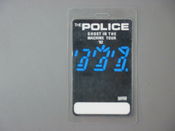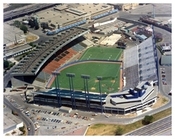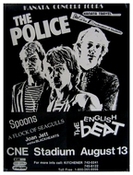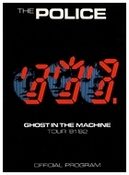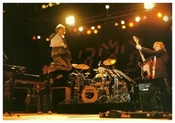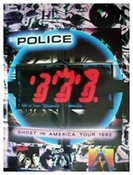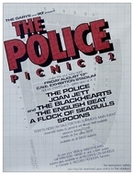
Ghost In The Machine
Aug
13
1982
Toronto, ON, CA
C.N.E. Stadiumwith Talking Heads, Joan Jett & The Blackhearts, A Flock Of Seagulls, The English Beat, Spoons
1
Talking Heads a treat at Picnic...
The Police Picnic '82, the festival of five rock groups at the Canadian National Exhibition Grandstand on Friday, came close to being the Talking Heads Picnic. The Talking Heads which preceded the headlining English trio on the bill offered a forceful and irresistibly rhythmic hour on stage.
It was the Police, though, which won out with the audience on the strength of the band's catchy pop melodies, polished reggae rhythms and Sting's plaintive singing. Musically, it was the usual impeccable playing from bassist Sting, synthesised guitarist Andy Summers, and drummer Stewart Copeland.
The Police is now in a position where it can play nothing but hits, and that's exactly what it did - from the opening, Message In A Bottle, to an extended version of 'So Lonely' in the second encore - with adroit and faultless professionalism, drawing the optimum response from the well-disposed audience.Sting was every inch the rock star, a kind of uptown Rod Stewart, loping about the stage as he plucked out the emphatic bass line of the band, shaking his derriere at the crowd, lolling against his amplifier, taking a turn on the bass violin and urging the audience to dance and sing along with him. The most awesome moment came during the song, 'One World', when the stadium lights shone over the crowd to present an army of waving arms, as everyone sang along to the anthemic call for global tolerance.
However, the professionalism couldn't eradicate the uncomfortable impression of cynicism in The Police's presentation, something calculated that shows through the big-time rock star hoopla, the tricky/simple arrangements and simplistic lyrics. It was an impression that was underscored by the warmth of The Talking Heads.
The Talking Heads confined itself to a quick survey of its musical history; opening with Psycho Killer. David Byrne forsook his guitar after the first few numbers to dance to the powerfully communal rhythms of the music, and most of the audience on the grandstand field followed suit. The jagged funk lines and surging choruses, over the dense percussive bottom of the music, sounded even richer live than on record; halfway through the set, the floor of the stadium was a sea of upraised arms, swaying back and forth in unison. It is this capacity to create instant and enthusiastic response - combined with some of the most lyrical and intelligent writing and playing that rock has ever seen - which makes Talking Heads a band of such importance; the only regrettable part was that the group wasn't on stage more than an hour.
The Spoons, the Canadian band which kicked things off at 4 o'clock, was much more drastically limited - to just six songs - but the set was a convincing demonstration that the band's textured and seductive sound could be conveyed successfully to a large audience, and the experience must have been an educational one. Flock Of Seagulls, a visually exotic English dance band with flashes of Roxy Music and plenty of infectious energy, also fared well. But the most exciting act was The English Beat, whose relentless; tight and joyful ska rhythms, backed by a jumping saxophone, offered the day's best shot of adrenalin.
The odd girl out was Joan Jett who, with her band, The Blackhearts, was sandwiched between The English Beat and The Talking Heads. As the sole metal artist on a new wave bill, Miss Jett was not given the audience's undivided attention and respect; to be specific, a lot of watermelon rinds and pieces of hot dog were flung at her. It was despicable behaviour on the part of the audience, but it was also less-than-brilliant planning on the promoters' part to put her on the bill at all. Miss Jett ploughed on obstinately, kept screaming ''How ya doin' Toronto?'' and managed to win the audience's respect by the end of the set.
(c) The Globe by Liam Lacey
The Police Picnic '82, the festival of five rock groups at the Canadian National Exhibition Grandstand on Friday, came close to being the Talking Heads Picnic. The Talking Heads which preceded the headlining English trio on the bill offered a forceful and irresistibly rhythmic hour on stage.
It was the Police, though, which won out with the audience on the strength of the band's catchy pop melodies, polished reggae rhythms and Sting's plaintive singing. Musically, it was the usual impeccable playing from bassist Sting, synthesised guitarist Andy Summers, and drummer Stewart Copeland.
The Police is now in a position where it can play nothing but hits, and that's exactly what it did - from the opening, Message In A Bottle, to an extended version of 'So Lonely' in the second encore - with adroit and faultless professionalism, drawing the optimum response from the well-disposed audience.Sting was every inch the rock star, a kind of uptown Rod Stewart, loping about the stage as he plucked out the emphatic bass line of the band, shaking his derriere at the crowd, lolling against his amplifier, taking a turn on the bass violin and urging the audience to dance and sing along with him. The most awesome moment came during the song, 'One World', when the stadium lights shone over the crowd to present an army of waving arms, as everyone sang along to the anthemic call for global tolerance.
However, the professionalism couldn't eradicate the uncomfortable impression of cynicism in The Police's presentation, something calculated that shows through the big-time rock star hoopla, the tricky/simple arrangements and simplistic lyrics. It was an impression that was underscored by the warmth of The Talking Heads.
The Talking Heads confined itself to a quick survey of its musical history; opening with Psycho Killer. David Byrne forsook his guitar after the first few numbers to dance to the powerfully communal rhythms of the music, and most of the audience on the grandstand field followed suit. The jagged funk lines and surging choruses, over the dense percussive bottom of the music, sounded even richer live than on record; halfway through the set, the floor of the stadium was a sea of upraised arms, swaying back and forth in unison. It is this capacity to create instant and enthusiastic response - combined with some of the most lyrical and intelligent writing and playing that rock has ever seen - which makes Talking Heads a band of such importance; the only regrettable part was that the group wasn't on stage more than an hour.
The Spoons, the Canadian band which kicked things off at 4 o'clock, was much more drastically limited - to just six songs - but the set was a convincing demonstration that the band's textured and seductive sound could be conveyed successfully to a large audience, and the experience must have been an educational one. Flock Of Seagulls, a visually exotic English dance band with flashes of Roxy Music and plenty of infectious energy, also fared well. But the most exciting act was The English Beat, whose relentless; tight and joyful ska rhythms, backed by a jumping saxophone, offered the day's best shot of adrenalin.
The odd girl out was Joan Jett who, with her band, The Blackhearts, was sandwiched between The English Beat and The Talking Heads. As the sole metal artist on a new wave bill, Miss Jett was not given the audience's undivided attention and respect; to be specific, a lot of watermelon rinds and pieces of hot dog were flung at her. It was despicable behaviour on the part of the audience, but it was also less-than-brilliant planning on the promoters' part to put her on the bill at all. Miss Jett ploughed on obstinately, kept screaming ''How ya doin' Toronto?'' and managed to win the audience's respect by the end of the set.
(c) The Globe by Liam Lacey
Comments
1
October 14, 2015
posted by jock
Set List Police Picnic II, CNE Stadium,
1. Voices/ Message In A Bottle
2. Every Little Thing She Does Is Magic
3. Walking On The Moon
4. Spirits In The Material World
5. Hungry For You
6. When The World Is Running Down
7. Bed's Too Big
8. Dedododo Dedadada
9. Demolition Man
10. Shadows In The Rain
11. Bring On The Night
12. Driven To Tears
13. One World - with Ranking Roger
14. Invisible Sun
15. Roxanne
16. Can't Stand Losing/ Regatta/ Be My Girl
17. Don't Stand So Close To Me
18. So Lonely
Newer comments 1 - 1 of 1 Older comments

